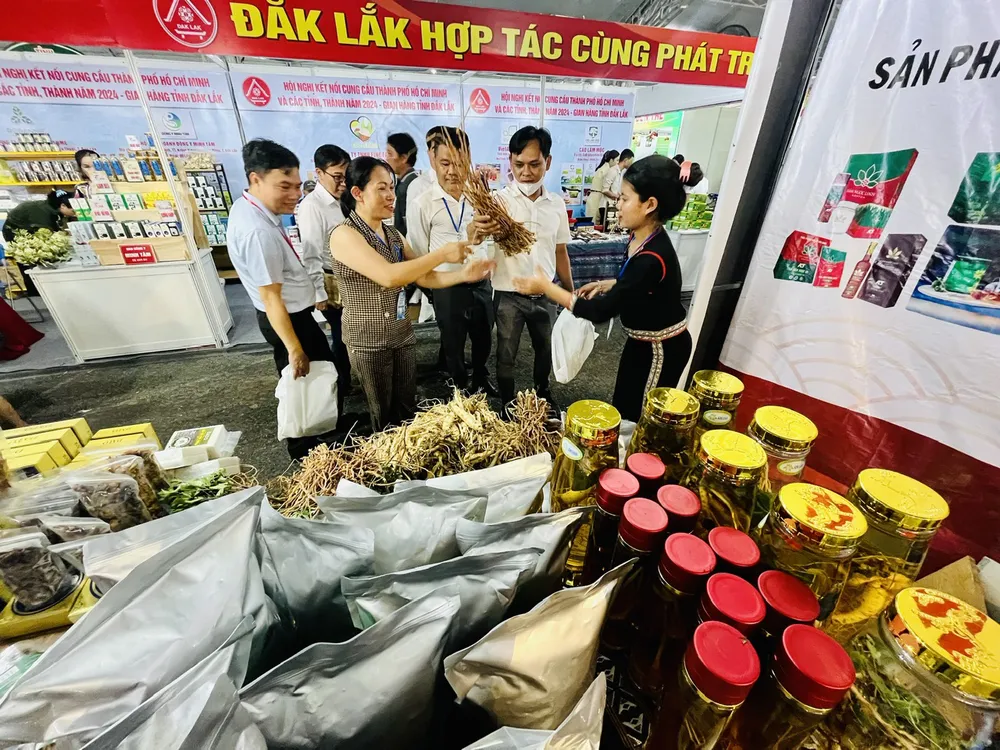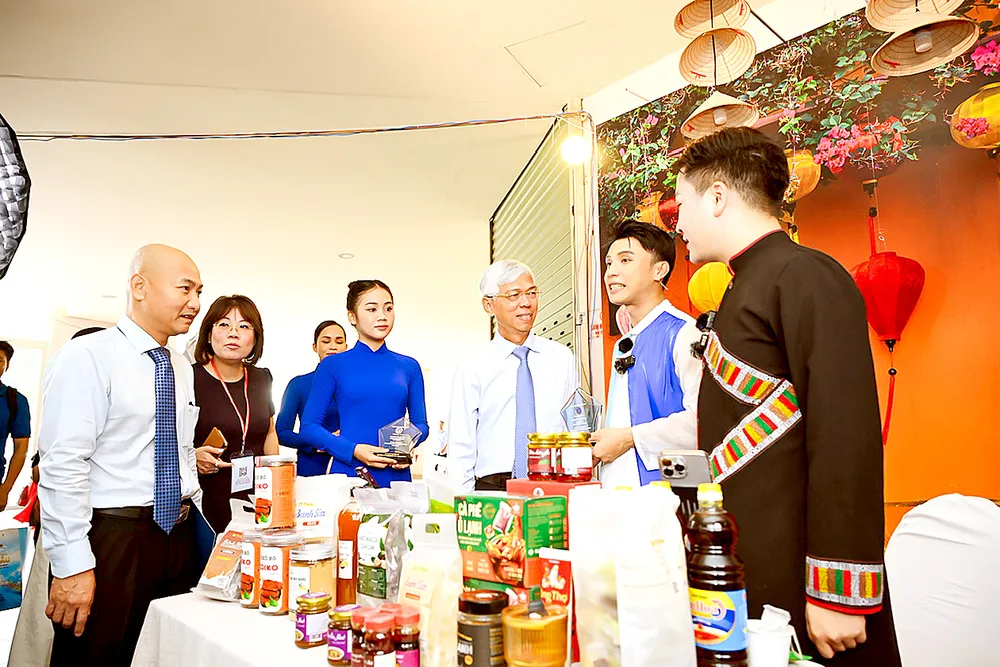Co-organized by the Ho Chi Minh City People's Committee and the Ministry of Industry and Trade on September 26, the event has seen a wide array of regional specialties showcased at Phu Tho Sports Arena (Lu Gia Street, District 11). These products are introduced to consumers over the course of the four-day event, running from September 26 to 29.
No concerns about shortages
During a midday walk around the booths on September 26, Nguyen Thi Minh Hien, a resident of Binh Thanh District, remarked on the abundance and variety of regional specialties. For instance, smoked buffalo meat was priced at VND800,000 to VND900,000 per kilogram, while soft dried bananas and soft dried plums were available for VND35,000 to VND40,000 per package. Other items like cham cheo dipping sauce and Docynia indica fruit ranged from VND25,000 to VND40,000 per box.
Several other products, including smoked Chinese sausages, Peng pha cakes, fermented pork belly, Moc Chau sticky rice, Ly Son garlic, Tay Bac honey, Lai Vung fermented pork rolls, and Binh Phuoc cashews, also attracted considerable attention from visitors.
At the smoked water buffalo meat booth of Lo Thi Suong from Dien Bien Province, the number of customers grew steadily into the afternoon. Suong was constantly on the phone confirming orders and providing details to interested buyers. Suong mentioned that all the buffalo meat at her booth was carefully selected to ensure high quality. She noted that discounts were available for purchases of 5 kilograms or more and emphasized their efforts to maintain stable prices, especially during holidays and festivals.

Since the start of the year, Ho Chi Minh City's Department of Industry and Trade has been preparing a market stabilization program for the peak season at year-end and the 2025 Lunar New Year. The program has drawn participation from around 70 major domestic and international enterprises, including Saigon Co.op, Satra, Central Retail, MM Mega Market, Aeon, Vinamilk, Nutifood, and Vissan. Overall, the total volume of goods has remained stable in both price and quality, effectively meeting the consumption needs of Ho Chi Minh City’s vast population.
The department also reported a 4-6 percent increase in the volume of stabilized goods for 2024 compared to 2023. These goods account for 21-32 percent of the market share during regular months and 24-41 percent of the demand during the Lunar New Year period, ensuring adequate market regulation.
This year's Supply-Demand Connection Conference saw strong participation from various regions, including provinces recently affected by floods, such as Bac Kan and Dien Bien, along with other provinces and cities like Long An, Dong Thap, Dak Lak, Tay Ninh, Can Tho, An Giang, Tien Giang, and Quang Nam. Mr. Tran Van Cuong, Deputy Director of Bac Kan’s Department of Industry and Trade, said that despite recent challenges, the supply of goods for the 2025 Lunar New Year is expected to remain steady, with enough provisions for local residents.
However, for provinces heavily impacted by Typhoon Yagi, the restoration of vegetable crops and livestock will take longer. Therefore, support from the Government and leading enterprises is crucial in speeding up the recovery process in the most severely affected areas.
Developing safe food supply chains
Ms. Nguyen Thi Bich Van, Communications Director of Central Retail Group in Vietnam, explained that the group’s supermarkets (GO! and BigC) actively take part in a program to monitor the quality of goods in Ho Chi Minh City. Central Retail prioritizes strict quality control from sourcing to distribution.
Mr. Nguyen Ngoc Thang, Deputy CEO of Saigon Co.op, said that if a product does not meet standards, it is immediately removed from circulation. At the same time, the company reports the issue to the Department of Industry and Trade and informs other distributors to prevent similar products from being sold. This process is completed within 24 hours of finding the issue.
Mr. Nguyen Nguyen Phuong, Deputy Director of the Ho Chi Minh City Department of Industry and Trade, noted that the Goods Quality Control Program, called “Responsible Green Tick,” has been in place since March 2024.
Currently, alongside the eight retail systems (Saigon Co.op, Satra, Aeon, MM Mega Market, Central Retail, Bach Hoa Xanh, Wincomerce, and Kingfood Market) that have signed cooperation agreements for quality control of goods, businesses and the public have shown significant interest in this program. The goal is to guide production activities towards safe and sustainable food supplies, with voluntary and proactive participation from stakeholders in the supply chain, ultimately targeting exports to demanding markets.

During the conference, Vo Van Hoan, Deputy Chairman of the Ho Chi Minh City People's Committee, noted that building a safe and sustainable supply chain should extend beyond merely connecting buyers and sellers; it must also enhance the responsibilities of suppliers, retailers, consumers, and regulatory agencies.
Mr. Vo Van Hoan instructed the Ho Chi Minh City Department of Industry and Trade to focus on post-connection solutions, including assisting businesses and individuals in completing supply documentation and resolving issues related to debts, delivery methods, payments, and inventory management. He emphasized the importance of strengthening online connection activities to provide small and medium-sized enterprises opportunities to promote and showcase their products, as well as to help them develop markets through e-commerce platforms and social media sales channels.
Deputy Minister of Industry and Trade TRUONG THANH HOAI: Enhancing product quality inspection and oversight
The Ministry of Industry and Trade requests provinces, cities, and businesses to prioritize improving product quality and developing green, safe supply chains to meet the growing consumption demands in the domestic market, while also aiming for export opportunities. Additionally, organizations should promote their products more extensively through e-commerce platforms and social media sales channels. Furthermore, inter-agency teams and market surveillance authorities should focus on post-inspection activities by monitoring and supervising product quality to ensure consumer health and safety.
























